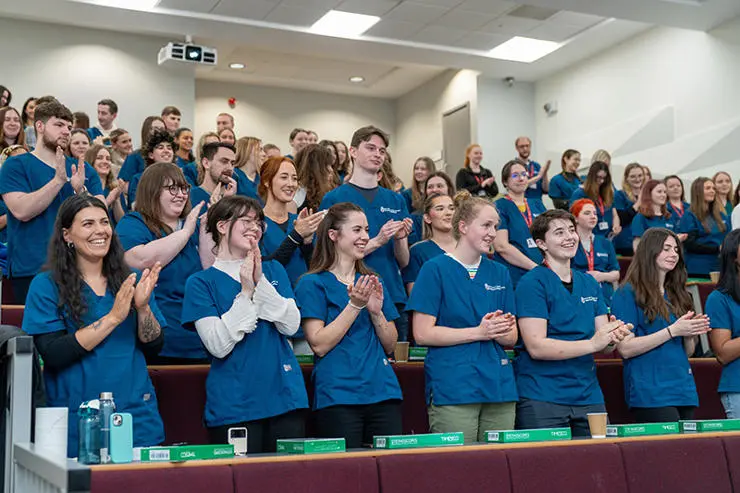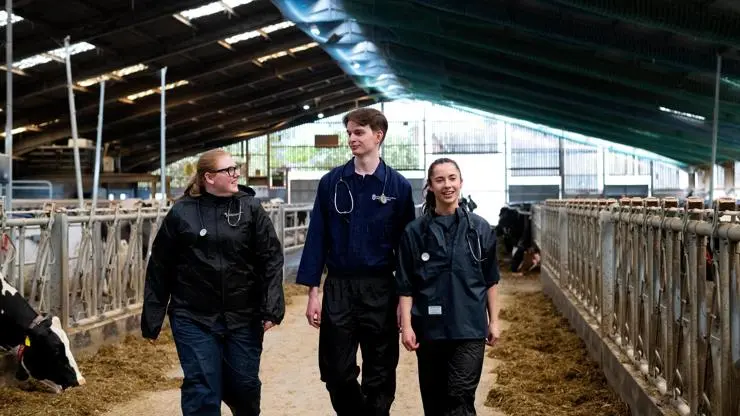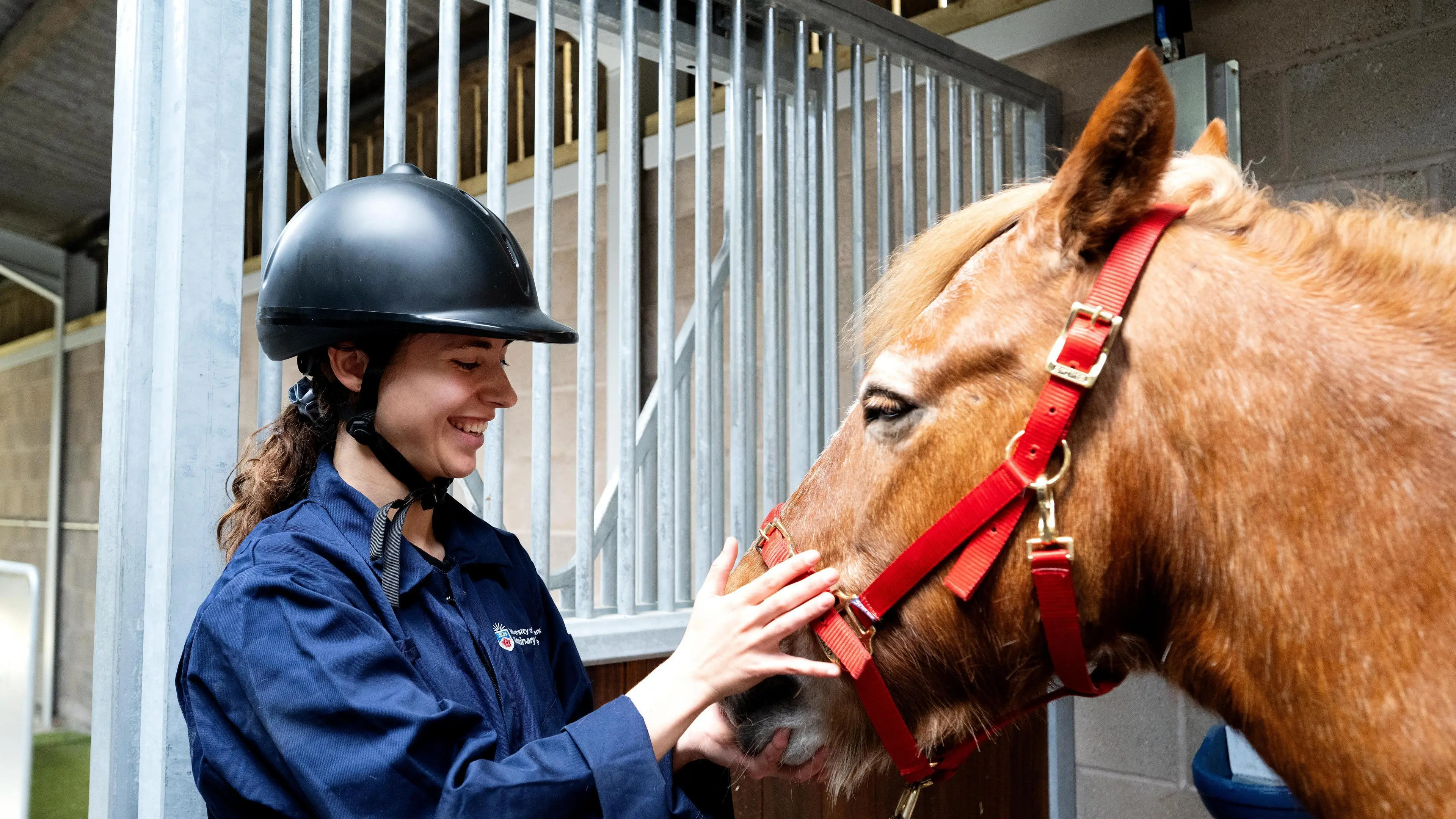Georgia Holt is a second degree student who joined the first cohort of BVMS students in 2023.
Georgia grew up in what she describes as a 'menagerie', a lively home filled with animals thanks to her father’s agricultural background.
One of her earliest memories that solidified her ambition to become a vet was a visit to the family rabbits. She instinctively sensed something was wrong and convinced her family to take them to the vet who confirmed her suspicion. That experience revealed her ability to notice subtle changes in animal behaviour and health, and it planted the seed of a lifelong goal.
At school, Georgia was known as the "token horsey girl" - highly competitive and full of energy. She approached PE lessons like Olympic trials, throwing herself into sport with the same intensity she brought to academics. She thrived during her GCSEs, but her A-Level results (B C D) were a setback to her original plan of studying Veterinary Medicine or Veterinary Nursing at Bristol University.

Determined not to give up, she tirelessly contacted universities through Clearing in 2018, searching for any possible gateway into veterinary medicine. Manchester Metropolitan University offered her a place to study Biomedical Sciences and despite never having visited the city before, she accepted the offer believing it was a gateway to achieving her original goal of becoming a veterinary professional.
While in Year 13, Georgia also applied to a national talent identification programme seeking potential athletes across five sports. With a background in (cycling) sprinting, she expressed interest in skeleton racing. After initial testing, she was invited to further assessments in Manchester her first time at a velodrome, which she found intimidating but exciting. Though she didn’t expect it to lead to anything, it unexpectedly marked the beginning of a parallel path.
She was later invited to various trials with British Cycling and despite not making the cut initially, she continued training independently, stayed committed throughout.
"I must have called every university offering some sort of veterinary or animal science degree during clearing, pleading with them to let me onto the course. I knew I wanted to be a vet and I wasn't about to give up on that."
— Georgia Holt
While studying, she also became a sports scholar at Manchester Metropolitan, winning national university championships and balancing the dual identities of Georgia the student and Georgia the elite athlete. She graduated with a 1st in 2021 and started a normal working life.
In 2022, the hard work paid off as she was invited to join the para-cycling squad as a tandem pilot. Georgia went on to represent her country at the 2022 Commonwealth Games and World Championships, piloting for elite visually impaired athletes including Sophie Unwin and Libby Clegg.
The plan was to retire after the 2028 Olympics. But in 2023, her cycling partner retired unexpectedly, leaving Georgia without a career pathway, as tandem cycling is a team sport, and a partner is essential. Unsure of her next steps, a manager at her workplace encouraged her to explore veterinary school options again.
On a whim, she reached out to the University of Lancashire about their new veterinary school even though it hadn’t opened yet. It was late in the recruitment cycle and so she was faced with the challenge of writing a personal statement in 48 hours to be in with the chance of an interview.
She completed the MMI (multiple mini-interview) process, an unfamiliar territory for someone no longer fresh from sixth form, and waited. Just a few weeks later, while training at the gym, she received an email confirming her place.
In September 2023, Georgia became part of the University of Lancashire’s first-ever BVMS cohort. She’d been nervous about being a second-degree or mature student, but quickly found others with similar stories. She said: “It was nice not to be the only one who wasn't straight out of college. It felt like I’d finally found my people.”
"I would always tell myself, when I’m not an athlete, I’ll be a vet."
— Georgia Holt
Starting veterinary school was both exciting and overwhelming for Georgia. In the first few weeks, she found herself sitting in lectures where each academic introduction came with a long string of letters after their names; PhDs, qualifications, fellowships. “It was a bit intimidating at first,” she said, “just being surrounded by so many people with incredible credentials.”
One of the standout aspects of the course for Georgia has been the strong sense of support. Each student is assigned not only a personal tutor but also a personal coach, which Georgia found particularly helpful. She said: “It’s really reassuring knowing someone is there just to help guide you through the process whether it’s academics or just adjusting to life at vet school.”
What surprised her most was how approachable the lecturers were. “They take the time to learn our names, which makes a huge difference. You feel seen, and that makes it easier to ask questions or speak up when you’re unsure.” That sense of connection and encouragement has helped Georgia find her footing in a demanding course, and she feels genuinely supported in her academic journey.
"I remember seeing third years at other vet schools talking online about doing their first intubations, but we’d already done that! We've been hands on since day one."
— Georgia Holt
One of the aspects of veterinary school Georgia has embraced most enthusiastically is the veterinary placements. From her first year, she began Intra-mural Rotations (IMR) at Wendy Lane Vets in Rochdale, a valuable experience that gave her early exposure to real-world practice. In addition to her IMR, she’s taken on Extra-Mural Studies (EMS) placements in a range of settings, including working with dogs and cats in catteries and kennels, lambing, dairy farms back home in Melton Mowbray, and even some time with exotic animals.
What stood out to her was just how practical and immersive the course has been from the outset. “I remember seeing third years at other vet schools talking online about doing their first intubations,” Georgia reflects. “But we’d already done that. From year one, we’ve been hands-on. It’s so empowering to realise this is what I’m training to do.”

Georgia particularly values the structure of the clinical settings she’s worked in especially the veterinary nurse-led teams, which have given her a better appreciation for the day-to-day operation and dynamics of a veterinary practice. Rotating through different departments gave her insight into the nuances of care, workflow, and teamwork. “It’s not just about being the vet,” she says. “It’s about understanding the whole practice how each role fits together. That’s been instilled in us from the beginning.”
These early, meaningful placements have only deepened Georgia’s enthusiasm. With every experience, she feels more confident and more certain that she’s exactly where she’s meant to be.
